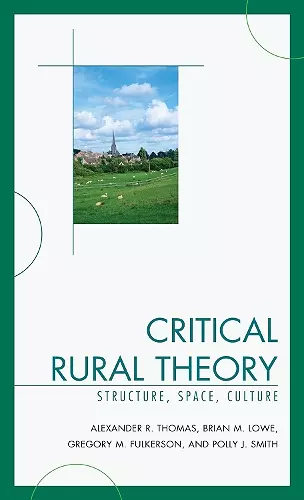Critical Rural Theory
Structure, Space, Culture
Alexander R Thomas author Brian Lowe author Greg Fulkerson author Polly Smith author
Format:Hardback
Publisher:Lexington Books
Published:17th Jun '11
Currently unavailable, and unfortunately no date known when it will be back
This hardback is available in another edition too:
- Paperback£45.00(9780739135600)

Critical Rural Theory is an attempt to bring together the concepts of structure, space, and culture in order to explain the relationship between rural communities and urban society. The overarching theme revolves around the many ways-structural, spatial, and cultural-in which urban systems create and maintain a hegemonic relationship with rural areas and people. Central to this theme is the concept of urbanormativity: the cultural assumption of the dominance and superiority of urban communities and patterns of life. Urbanormativity is an outgrowth of the structural forces in an urban society that favor the interests of cities over those of the countryside, of a generally exploitative relationship between the two. The structure of a society is encoded in the settlement space, which in turn influences one's experience. The experience of social space produces cultural dynamics that are reproduced from generation to generation. These mechanisms are explored through popular culture, physical patterns of urban expansion, and historical patterns of social change.
With regard to the discipline, the authors give a nice overview of the somewhat puzzling ‘retreat from the rural’ of mainstream sociology in the early 20th century and the resulting ‘urban bias.’ They focus somewhat less on the parallel development and divergences of ‘rural’ and ‘regular’ (urbancentric) sociology as quasi-independent fields, complete with separate scholarly organizations and intellectual orientations. Interestingly they also point to the recent retreat from the rural among departments formerly known as rural, now identified variously as some combination of ‘development,’ ‘community,’ or ‘environmental’ sociology. . . . I found much in the book to recommend…..I hope that this book will be of interest and use to a broad range of sociologists—and not only those who are already interested in the rural. * American Journal of Sociology *
Noting that cultural analyses of rural areas are lacking in the scholarly literature, the authors take as their primary task the investigation of culture in relation to political-economy and the organization of space. . . .[The book's] broad theoretical approach to analyzing the urban/rural divide in terms of the interaction of structure, space and culture is a welcome contribution to a general sociological literature that overlooks rural space and a rural sociological literature that often reifies and depoliticizes it by treating it as a categorical variable. * Contemporary Sociology *
The cultural, spatial, and structural mechanisms of urbanormativity illuminated in Critical Rural Theory represent a crucial contribution to rural sociology and broader social science disciplines. Incorporating contemporary theory, rigorous empirical methods, and cultural analyses at the community level, this volume provides a sobering—yet emancipatory—account of the marginal position of rural communities in the spatial hierarchy. -- Christopher J. Stapel, University of Kentucky
The literature on rural cultures in the United States has languished for years. This book takes a critical, cultural turn and provides a very strong argument for renewed attention to the rural areas of this country - its regional cultures and its social problems. Through the use of concrete examples from rural areas of New York State, the authors show readers that the sociological gaze should reach further than metropolitan hubs for interesting sociological analyses. By their example the authors urge us to look beyond the myths of our pastoral past to see the very real rural present and future. -- Karen E. Hayden, Merrimac College
Exceeding the boundaries of both rural and urban sociology, Critical Rural Theory: Structure, Space, Culture adapts critical theory and spatial analysis to render visible the rural peoples and cultures that feed us all and that so often shape our dreams of a peaceful past. Looking at how urban dependence on rural areas results in an urban cultural dominance, authors Alexander R. Thomas, Brian Lowe, Greg Fulkerson, and Polly Smith provide well-reasoned and varied perspectives for revaluing and re-evaluating the role of rural people and places in the global economy. Whether they are discussing real places or grand theories, the writers make an argument that will interest scholars and students of identity theory and cultural politics. -- Barbara Ching, Iowa State University
ISBN: 9780739135594
Dimensions: 230mm x 150mm x 22mm
Weight: 435g
224 pages